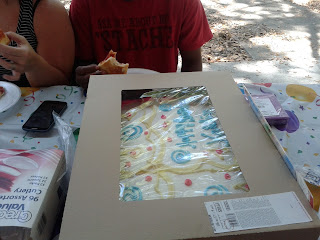All science is a form
of art. A scientific mind requires looking at the present and manifesting into
existence a vision using knowledge obtained from observation from the
environment (Williams & Wilkins, 2011). Science would not exist without art. Practicing
a nursing career without the application of the artistic aspects of the profession,
would significantly impact the care a nurse provides for a patient (Youngman,
2010).
Webster’s dictionary defines art as the
use of creativity to make things of inspired meaning (Merriam- Webster’s 1993).
The foundation of nursing was based on the art of caring (Williams &
Wilkins, 2011). Caring
in nursing is not a mere emotional connection with the patient. Caring in
nursing is a therapeutic connection with the patient (Youngman, 2010). The
therapeutic relationship assists the patient with healing. With technology
expanding at an expediential rate, the art of nursing can be mislaid. The art
of caring is what distinguishes nursing from other medical disciplines (Youngman,
2010). For nursing to establish itself as a profession it must remain true to
the institutions it was built on (Williams & Wilkins, 2011).
One criterion for an occupation to be
considered a profession is the ability of that career to serve society in an
altruistic manner (Williams & Wilkins, 2011). Nurses serve society by
helping patients find meaning in health challenges; confronted throughout the
lifespan (Vance,
2001). This requires each nurse to look beyond
technology and put the art of caring to practice (Youngman, 2010). If nursing is to be more than just a job, the
artistic side must be practiced in order for it to become a profession (Williams
& Wilkins, 2011).
The Met paradigm of nursing generally is defined by the following
4 concepts person, environment, health, and nursing. Do you agree with this
global representation of nursing why or why not?
An area of the nursing
discipline that would be of value to include in the met paradigm of nursing is
spirituality. It is a general need by all human being to find meaning from
suffering (Vance, 2001). Nurses are with
the patient through the life span. It would be beneficial to the discipline of
nursing to examine the significance of spirituality in all aspects of care (Vance,
2001).
The
study of spirituality would meet the criteria of a met paradigm. The reason it
would qualify to be a met paradigm is: it would be of value, of interest and
has unique aspects that can only be applied to nursing (William & Wilkins,
2011). The study of spirituality could remain neutral, not reflecting cultural
ethical beliefs and standards (William & Wilkins, 2011).
Research by Diana Vance studies the
association between a nurse’s attitude about spirituality beliefs and clinical
outcomes in patients (Vance, 2001). Vance’s study is an example of how nursing
research could be conducted in a non-bias manner (Vance, 2001). In Vance inquiry into how nurse’s spiritual
beliefs affect patient outcomes, it was validated that there is an association
between spiritual care and positive clinical outcomes (Vance, 2001). Nurses
providing spiritual care had patients with a better sense of wellbeing, better
coping mechanism and decreased complication after surgery (Vance, 2001). The research done by Vance demonstrates that
the studies of spirituality can be approached in a non-bias scientific manner (Vance,
2001). Spirituality is a dimension of nursing practice that needs further
investigation (Vance, 2001).
3) Up until now has nursing theory or philosophy been important to
your own practice why or why not?
For theory to be of any
practical worth it must be understood (Williams & Wilkins,
2011). At the start of my nursing career, the
lectures on nursing theorist were my ideal of nursing. I was enamored by the
great women in nursing history: Florence Night gale, Lydia Hall, Pat Brenner. In
my early training I found a significant amount of the theory’s I was taught
hard to understand and apply to my trade. Many of the theories and
philosophies seemed an impossible standard to meet (Williams
& Wilkins, 2011).
After reading chapter two I began to
appreciate the significance of nursing theory and philosophy in my practice.
The early principles were the foundation for the evidence biased practice. The
early values and beliefs that bequeathed to me were solid groundwork to
cultivate my own career and continue to grow and evolve the profession. Nursing
theories and philosophy were established in a manner that they were able to
mature with the profession (Williams & Wilkins, 2011).
Define:
Ontology-
Ontology
is the study of existence and the genuineness of the experience (Williams &
Wilkins, 2011).
Extant-
A
perceived reality (Merriam- Webster’s
1993).
Epistemology-
Epistemology is the study of knowledge and truth and the ability to recognize
the association between the two (Williams & Wilkins, 2011).
Logical
positivism – Science is without prejudice and uses fact-based
methods to separate scientist beliefs
and worldviews. The purpose of science is to understand and control potential
outcomes (Williams & Wilkins, 2011).
Post
positivism – All knowledge is subject to questioning and
scientific rigor. That all facts and understanding obtained by investigation
can be influenced by the researcher’s values, beliefs and world views (Williams
& Wilkins, 2011).
Received
view
– Understanding is gained by hearing and gathering knowledge (Williams &
Wilkins, 2011).
Perceived
view-
Research done that is not in a controlled lab environment. The motivation of
the research is the strict observations of the subjects in the experiment
(Williams & Wilkins, 2011).
Paradigm-
A paradigm is a type of research that reflects the ethics, hypothesis,
standards, practices and theories at any specific time (Williams &
Wilkins).
References
McEwen, M.,& Wilkins, E. (2011). Theoretical
basis for nursing.
Philadelphia, Baltimore, New York, London, Buenos Aires, Hong Kong,
Philadelphia, Baltimore, New York, London, Buenos Aires, Hong Kong,
Sydney, Tokyo; Wolters Kluwer.
Vance D.L (2001). Nurses’ attitudes towards
spirituality and patient care. MedSurg
Nursing 10(5),264.Retrieved from
http;//search.proquest.com/docview/230520902?accountid=12085
(1993). The New webster’s dictionary.Danbury,CT.
Youngman, A. (2010). Creative nursing: art or
science? British journal of nursing.
19
(14),939.


